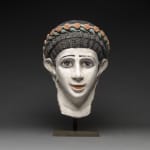Roman Period Plaster Funerary Mask of a Woman, 100 CE - 200 CE
Plaster
28.4 x 19.8 cm
11 1/8 x 7 3/4 in
11 1/8 x 7 3/4 in
LO.1312
Customary to the Egyptian funerary tradition, a mask is created to cover the face of the deceased and replaces the mutilated visage of the mummified corpse in the eternal life....
Customary to the Egyptian funerary tradition, a mask is created to cover the face of the deceased and replaces the mutilated visage of the mummified corpse in the eternal life. This particular Roman Period plaster funerary mask is striking in its vibrant and well-preserved hues. The woman appears to be wearing a decorative headdress embellished with rosette-like figures, which resemble jewelry. The turquoise base of the headdress envelops the woman’s hair in twisted braids. One also views her elaborate coiffure modeled in relief, which attests to the Roman influence upon an ancient Egyptian tradition. This seemingly young woman gazes at us with her large, almond-shaped eyes beautifully outlined in black by kohl, a popular cosmetic practice. The grayish eye shadow and black mascara enhance the size of the woman’s eyes. With lips reddened to match the color of the rosettes on her headdress, her mouth is cracked open to reveal a possible intention to initiate conversation. Does this woman have something to say? The woman’s stare leaves an everlasting impression on us and ignites our imaginations even more to further understand her role and function during the Egypto-Roman period.



